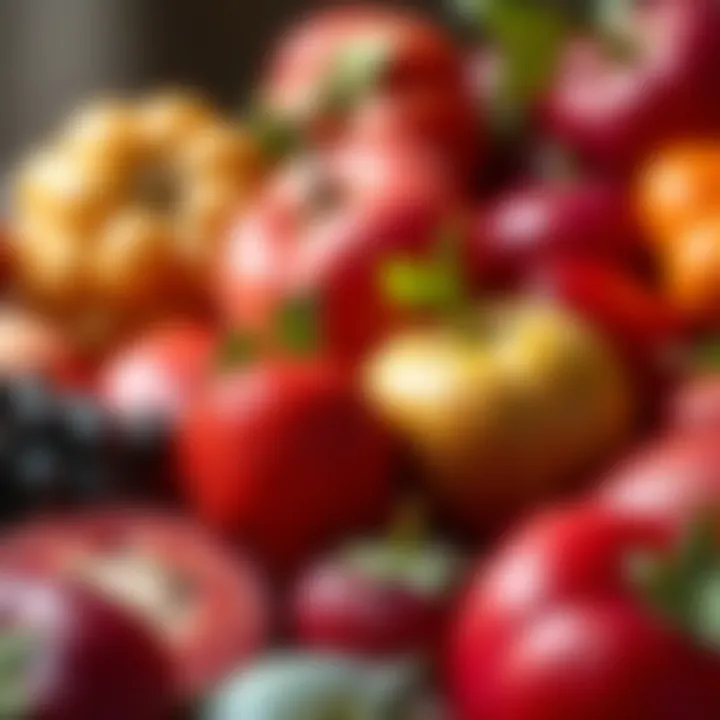Sources of Quercetin: A Comprehensive Guide


Intro
Quercetin is not just another buzzword in the health community. This powerful flavonoid, found naturally in a variety of foods, plays a significant role in promoting health through its anti-inflammatory and antioxidant properties. What’s fascinating is not just the benefits it offers but also the astonishing range of sources where it can be found.
In this guide, we will embark on a detailed journey to uncover where you can find quercetin, what benefits you can expect, and how to incorporate it seamlessly into your daily routine. The aim is to provide clarity on this often-overlooked nutrient and illustrate how its presence in our diets can enhance our overall wellness.
From fruits and vegetables to supplements, quercetin is relatively easy to include in one’s diet, yet many of us may not even realize how we might already be reaping its benefits. This piece is designed for health professionals, wellness coaches, nutritionists, fitness trainers, and mindfulness instructors who are eager to deepen their understanding of quercetin and see its practical applications in dietary practices.
Let’s delve into the key benefits of quercetin to understand why it deserves a prominent spot in our nutritional discussions.
Foreword to Quercetin
Quercetin is a flavonoid that sits firmly in the spotlight when it comes to natural health, especially in discussions around nutrition and wellness. This powerful antioxidant isn't just a trendy topic; it offers considerable benefits that elevate it beyond mere conversation. By diving into the essential nature of quercetin, we can appreciate its potential contributions to human health.
Definition and Chemical Structure
Quercetin is a naturally occurring plant pigment, scientifically categorized as a flavonoid. Its chemical formula is C150O7, and it exists within a rich spectrum of colors ranging from golden yellows to deep reds. What makes quercetin distinctive is its complex chemical structure, which enables it to perform various biological functions.
The flavonoid structure consists of two benzene rings linked by a three-carbon bridge. This arrangement allows quercetin to interact effectively with free radicals, neutralizing harmful oxidative processes that can damage cells.
Moreover, it comes in several glycoside forms, making it highly versatile in its abundance across different food sources. By understanding how this molecule is structured, readers can better appreciate its various applications in health and nutrition.
History and Discovery
Quercetin's history is steeped in botany and traditional medicine. It was first identified in 1857 by the German chemist Arthur Stoll. However, its roots trace back much further, with various cultures utilizing quercetin-rich plants for centuries, often as ingredients in folk remedies.
In early medical practices, practitioners would harness the properties of quercetin for its anti-inflammatory effects, although specifics at that time were limited. The name "quercetin" is derived from the Latin word "quercus," meaning oak, hinting at the oak trees which yield this beneficial compound. Today, with modern lab techniques, we can isolate quercetin and study its health benefits in detail.
Quercetin stands at a fascinating intersection of traditional knowledge and modern science. As interest in natural health grows, it remains a pivotal point in understanding how our diet can influence well-being.
"Understanding compounds like quercetin is essential not just for practitioners of health but for anyone interested in optimizing their diet."
Natural Sources of Quercetin
Quercetin, a potent flavonoid, offers numerous health benefits, and understanding its natural sources is essential for those keen on improving their dietary habits. This section shines a light on various natural foods rich in quercetin, offering insights into their contributions to our well-being. By consuming these foods, individuals can take advantage of quercetin's properties while diversifying their diets with flavorful options.
Fruits Rich in Quercetin
Apples
Apples are well-known for their crunchy texture and sweet flavor, but they pack more than just taste. A common fruit found in many households, apples shine in quercetin content, particularly in the skin. The key characteristic of apples is their convenience; they can be easily carried for a snack or used in various dishes, making them a popular choice for anyone looking to enhance their antioxidant intake. One unique feature of apples is the variety; from tart Granny Smiths to sweet Fuji apples, each type contributes differently, adding versatility to meals. However, it's important to wash apples thoroughly or choose organic options to minimize pesticide exposure.
Berries
Berries are like little bursts of flavor and color, making them an exciting addition to many diets. This category includes strawberries, blueberries, and blackberries, all of which are good sources of quercetin. A striking characteristic of berries is their high antioxidant capacity, which complements quercetin's health benefits. They can easily be incorporated into breakfast smoothies, snacks, or desserts. While the sweetness is appealing, the potential downside is their often higher price compared to other fruits, but their health contributions make them worth the investment.
Cherries
Cherries, with their vibrant color and sweet taste, are not just a treat in the summer. They are also a fantastic source of quercetin. Their chief characteristic is the rich, deep flavor that enhances many dishes, whether it be pie or salads. What sets cherries apart is their unique ability to promote better recovery after exercise due to the anti-inflammatory properties they offer. However, they can be seasonal, and finding fresh cherries out of season can be challenging, making canned or frozen options a consideration during those months.
Vegetables High in Quercetin
Elderberries
Although often overlooked, elderberries are a powerhouse when it comes to quercetin. Elderberries are primarily known for their potential immune-boosting properties, but their quercetin content adds extra appeal. A notable feature of elderberries is their use in syrups and jams, which can easily integrate into the diet. However, raw elderberries can be toxic; thus, it's crucial to consume cooked or processed varieties, usually in syrup form.
Red Onions


Our next contender is the humble red onion, often used as garnish or base in many cuisines. Red onions are a standout source of quercetin, especially in their raw form. Their sharp flavor adds depth to salads and dishes, making them a versatile choice. Interestingly, they can also aid in digestive health, serving multiple purposes in the kitchen. On the downside, some might find them a bit pungent when raw, which can deter certain palates.
Broccoli
Broccoli isn't just your average vegetable; it’s also a significant source of quercetin. Its mild flavor and crunchy texture make it a favorite among many. The highlight of broccoli is its richness in vitamins and minerals, making it a staple in health-conscious diets. The unique feature lies in its versatility; it can be steamed, stir-fried, or eaten raw. Yet, some folks might wrinkle their noses at the thought of broccoli unless well-cooked, which can sometimes reduce its health benefits.
Herbs and Spices Containing Quercetin
Parsley
Frequently used as a garnish, parsley is sometimes underrated in its nutritional value. This herb contains a notable amount of quercetin and provides numerous vitamins and minerals. The bright flavor of parsley enhances dishes, making it an excellent addition to salads and sauces. The unique advantage of parsley is its low-calorie count, allowing for flavor enhancement without the worry of additional calories. However, due to its strong flavor, some should tread lightly when using it.
Green Tea
Green tea is revered globally not only for its soothing properties but also as a source of quercetin. Rich in catechins, green tea complements quercetin's benefits. Its light, slightly grassy flavor can be refreshing and adds variety to one's beverage choices. The unique feature of green tea is its versatility; it can be enjoyed hot or cold and in various health-focused products. However, some might find the taste a bit bitter if steeped for too long.
Ginkgo Biloba
Often hailed for its memory-boosting attributes, Ginkgo Biloba also contains quercetin. This herb is popular in dietary supplements aimed at improving cognitive function. Its distinct characteristic lies in its antioxidant properties, which can work synergistically with quercetin. Although Ginkgo Biloba offers various health benefits, its effectiveness may require consistent intake for noticeable results, which could be a consideration for some users.
Grains and Legumes with Quercetin
Quinoa
Known as a superfood, quinoa is more than just a trendy grain; it’s a source of quercetin, making it doubly beneficial. Its nutty flavor and high protein content make quinoa a fantastic alternative to rice and other grains, appealing to health-conscious individuals. One unique feature is its gluten-free nature, which accommodates various dietary restrictions. However, some individuals might experience a slight bitterness if not rinsed properly before cooking.
Lentils
These small legumes are a staple in many cuisines and pack a punch regarding nutrition, including quercetin. Lentils are remarkably versatile, used in soups, stews, and salads. Their high fiber content supports digestive health, alongside offering various vitamins and minerals. The unique feature of lentils is their quick cooking time compared to other legumes; yet, they may require proper seasoning to enhance their flavor.
Kidney Beans
Kidney beans are remarkable not just for their vibrant red color but also for their quercetin content. Known for their use in chili and salads, they provide a hearty texture that can make meals feel more substantial. Their high protein and fiber content make them a healthy choice. However, they should always be cooked properly to avoid potential digestive issues that can come from consuming raw or undercooked beans.
Incorporating a variety of these quercetin-rich foods into your diet can significantly enhance your overall health while keeping your meals interesting and enjoyable.
The Role of Quercetin in Human Health
Quercetin, a flavonoid often mentioned in health discussions, plays a pivotal role in human health. Finding its way into our diets through various natural foods, it has gained attention for its broad spectrum of health benefits. Understanding these benefits can help individuals maximize their nutrition and support overall well-being. Quercetin's antioxidant properties, anti-inflammatory effects, and potential in disease prevention are particularly noteworthy, making it a subject of extensive research. Here, we delve into each of these crucial elements in greater detail.
Antioxidant Properties
One of the most prominent characteristics of quercetin is its strong antioxidant profile. Antioxidants are substances that help neutralize free radicals in the body, which can cause cellular damage leading to various health issues. Quercetin works diligently to scavenge these harmful particles, thereby aiding in the protection of body cells from oxidative stress. This protection not only has implications for aging but also supports immune function. For instance, some studies suggest that quercetin can enhance the activity of immune cells, potentially bolstering defenses against common illnesses.
Anti-Inflammatory Effects
In addition to its antioxidant action, quercetin is recognized for its anti-inflammatory effects. Chronic inflammation has been linked to a myriad of diseases, including heart disease and arthritis. Research indicates that quercetin may inhibit the activity of pro-inflammatory enzymes such as COX-2, which contributes significantly to inflammation. By mitigating inflammatory processes, quercetin may assist in managing discomfort and improving the quality of life for those with inflammatory conditions. It's encouraging to note that incorporating quercetin-rich foods into one’s diet could offer a natural means to enhance overall health.
Potential in Disease Prevention
Cardiovascular Health
Quercetin's potential role in cardiovascular Health is a point of considerable interest. Evidence suggests that it may help reduce blood pressure and improve endothelial function. The endothelium is crucial for good blood flow and maintaining vascular health. A key characteristic of cardiovascular health is its influence on overall wellness, as cardiovascular diseases are always a leading cause of mortality. Quercetin's quality to improve endothelial function and lower blood pressure makes it a significant ally in heart health. However, it’s vital to combine quercetin with other healthy lifestyle choices, such as regular exercise and a balanced diet, for the best results.
Cancer Research
Another area where quercetin shows promise is cancer research. Mmm, this flavonoid has exhibited anti-cancer properties in various studies. The ability to inhibit cell proliferation and promote apoptosis, or programmed cell death, is relevant to cancer treatment strategies. Many researchers are excited about quercetin due to its ability to target specific cancer cells without harming surrounding healthy tissue. However, while the research is promising, it remains at stages where more rigorous clinical trials are needed. As a result, it's wise not to rely solely on quercetin but to consider it as part of a broader cancer prevention or treatment strategy.


Diabetes Management
Diabetes management is another field where quercetin’s potential shines. Some studies indicate that quercetin may help regulate blood sugar levels by modulating insulin sensitivity. The key feature here is quercetin’s capability to enhance pancreatic function and slow glucose absorption in the intestines. This property makes it a favourable option for individuals dealing with diabetes, alongside traditional medication. Nevertheless, as with cancer, it is essential to approach diabetes management holistically, integrating dietary changes and exercise with any supplementary use of quercetin.
Quercetin in Dietary Supplements
The inclusion of quercetin in dietary supplements has become increasingly relevant, particularly in light of its promising health benefits. As a flavonoid known for its anti-inflammatory and antioxidant properties, it holds considerable appeal for individuals seeking to enhance their overall health through nutrition. The availability of quercetin in various supplement forms offers a convenient option for those who may struggle to consume adequate amounts through diet alone.
Types of Quercetin Supplements
Quercetin is available in several supplement formats, each catering to different preferences and needs. The most common types include:
- Capsules: One of the most popular forms, capsules allow for easy and accurate dosing.
- Tablets: Similar to capsules, these can provide a larger dose but may contain different binders or fillers that some users prefer to avoid.
- Powder: This form can be mixed into beverages or smoothies, offering flexibility in consumption.
- Liquid extracts: For those who dislike swallowing pills, liquid forms can be a viable alternative. They are often absorbed more quickly by the body.
When considering a quercetin supplement, it is essential to examine the absorption rate as some formulations may contain additional ingredients to enhance bioavailability.
Benefits and Considerations
The use of quercetin supplements can provide a range of benefits, though there are considerations to keep in mind:
Benefits:
- Enhanced immune function: Quercetin is recognized for supporting the immune system, potentially lowering the risk of infections.
- Allergy relief: Some evidence suggests that quercetin can help alleviate symptoms associated with seasonal allergies, working as a natural antihistamine.
- Support for athletic performance: The antioxidant properties may aid recovery and reduce oxidative stress from intense exercise.
"Incorporating quercetin supplements into one’s routine may offer health benefits that align with overall wellness goals."
Considerations:
- Consultation with professionals: It's always advisable to consult with healthcare professionals before starting any new supplement, especially if one is pregnant, nursing, or has any chronic health conditions.
- Possible interactions: Quercetin can interact with certain medications, such as antibiotics and anticoagulants. Being aware of these interactions is critical to avoid adverse effects.
- Doses vary: Not all supplements provide the same dosage; hence understanding the required amount for efficacy is vital.
In summary, while quercetin supplements offer numerous potential benefits, careful consideration must be given to their use. Individuals should assess their own health needs and consult with professionals to create an informed approach to incorporating quercetin into their dietary regimen.
Incorporating Quercetin into Your Diet
In today’s world, where health consciousness is on the rise, the importance of incorporating quercetin into your diet cannot be overstated. Quercetin, a powerful flavonoid known for its anti-inflammatory and antioxidant properties, has the potential to bolster overall health. This section delves into why introducing quercetin into your daily meals is not just advisable but may very well elevate your nutritional game.
Quercetin can be found in a variety of natural sources, most of which are accessible and easy to integrate into one's daily consumption. The benefits of including quercetin-rich foods in your meals range from enhancing immune function to supporting cardiovascular health. Specifically, consuming reasonable amounts of this flavonoid may help reduce symptoms related to allergies and skin conditions, while also playing a role in muscle recovery post-exercise. Here’s why it truly matters:
- Food Variety: When you think of quercetin, think of not just apples and onions, but also lesser-known sources like capers or certain leafy greens. This variety keeps your diet interesting.
- Daily Wellness: Regular intake of quercetin can help combat oxidative stress and inflammation, both of which are linked to chronic diseases.
- Practicality: Incorporating quercetin doesn’t have to be complex. A few simple swaps in your meal planning can make all the difference.
Recipes Featuring Quercetin-Rich Ingredients
Creating meals that are both nutritious and delicious becomes a cinch when you know which ingredients pack a quercetin punch. Here are a few recipes to get you started:
- Apple and Onion Salad: Combine thinly sliced red apples with caramelized red onions, a sprinkle of toasted walnuts, and a light vinaigrette for a refreshing salad.
- Berry Smoothie: Blend a handful of mixed berries like blueberries and strawberries with spinach and a banana. By adding in Greek yogurt for creaminess, you can maximize both taste and nutrition.
- Caprese Quinoa Bowl: Toss cooked quinoa with cherry tomatoes, fresh basil, mozzarella balls, and a drizzle of balsamic glaze. The tomatoes and basil are excellent sources of quercetin and flavor.
These recipes make it easier to enjoy the natural sweetness and flavors while also reaping the benefits of quercetin.
Meal Planning for Optimal Intake
Strategizing your meals to ensure you get enough quercetin should be a part of your weekly planning. Here are some tips to incorporate quercetin-rich foods throughout your week:
- Plan Your Grocery List: Before hitting the store, jot down a list that includes quercetin-rich items such as apples, berries, kale, and onions. This will help you stay focused and ensure you’re making healthier choices.
- Prep Ahead: Cook large portions of quinoa or brown rice at the start of the week and pair them with various vegetables. Incorporate broccoli or bell peppers during the week to keep meals diverse.
- Mix and Match: Use the idea of pairing fruits and veggies that are high in quercetin with proteins. For instance, chicken salad with red onions or a turkey wrap with leafy greens can go a long way.
Having a plan allows for greater flexibility and ease during busy days. Quercetin-rich foods can become a central pillar in your meal planning, making strides towards a healthier lifestyle.
Potential Side Effects and Interactions


Understanding the potential side effects and interactions of quercetin is essential for anyone interested in its health benefits. While quercetin is generally regarded as safe when consumed through natural food sources, there are cases where taking it in higher doses, particularly through supplements, can lead to unwanted effects. These nuances are important not just for individual health but also for professionals advising clients on its use.
Common Side Effects
Though quercetin is often praised for its purported health benefits, it’s not without its side effects, especially when taken in high doses. Common issues include:
- Gastrointestinal Disturbances: This might manifest as upset stomach, gas, or even diarrhea for some individuals.
- Headaches: While the reasons for this are not fully understood, some users experience headaches after ingestion.
- Allergic Reactions: Rarely, some people may develop allergic responses, possibly including skin rashes or itchy eyes.
- Kidney Issues: In high concentrations, quercetin may affect kidney function, particularly in individuals with pre-existing conditions.
"Moderation is key. What works wonders for one might end up a nuisance for another."
By paying attention to how your body reacts and steering clear of excessive dosages, you can enjoy the benefits without the downsides.
Drug Interactions
It’s vital to be aware of how quercetin may interact with certain medications. Some of the notable interactions include:
- Blood Thinners: Quercetin may enhance the effects of anticoagulant drugs like warfarin, increasing the risk of bleeding.
- Certain Antibiotics: Some studies suggest that quercetin could interfere with the effectiveness of antibiotics like ciprofloxacin.
- Immunosuppressants: For those on medications to suppress the immune system, quercetin might counteract their efficacy, potentially leading to flare-ups.
- Statins: If you're on cholesterol medications, quercetin may also have a role in modulating their effects, which could either enhance or diminish their benefits.
It’s crucial for anyone considering quercetin, especially in larger doses, to consult a healthcare provider, particularly if they are on other medications. Being well-informed helps to balance the benefits of quercetin with any health risks.
Research and Future Directions
The study of quercetin is akin to peeling an onion; every layer reveals something new and insightful about its potential role in our health. The exploration into research and future directions is vital, especially considering the increasing interest in natural compounds and their therapeutic potentials. Quercetin, a prominent flavonoid, has garnered attention for its ability to combat oxidative stress and inflammation. As we delve into this topic, it becomes clear that ongoing research will further illuminate quercetin's benefits, potentially reshaping dietary recommendations and supplement practices.
Current Studies on Quercetin
Current studies are increasingly shedding light on the myriad benefits of quercetin. Researchers are looking above and beyond the known antioxidant properties, venturing into new territories of health benefits related to quercetin. A series of clinical trials have been initiated that analyze its effects on various conditions. For instance, recent investigations have focused on:
- Cardiovascular health: Researchers are analyzing how quercetin influences heart health, particularly its potential in managing blood pressure and improving endothelial function.
- Respiratory disorders: With the rise of respiratory ailments, especially post-pandemic, studies are examining how quercetin might alleviate symptoms associated with conditions like asthma and chronic obstructive pulmonary disease (COPD).
- Metabolic syndrome: The relationship between quercetin and metabolic health is another frontier. Some studies are looking at how incorporating quercetin into diets may help manage insulin sensitivity and reduce inflammation linked to obesity.
Such studies offer hope that quercetin could be a cornerstone in holistic health solutions. When reviewing these findings, it's essential to rely on multiple sources to piece together the broader impact of quercetin. No single study provides all the answers, and collaboration among various fields of research will strengthen our understanding of quercetin’s potential.
"Quercetin can be thought of as a bridge linking nature with science, providing a pathway to better health outcomes when backed by rigorous study and clinical evidence."
Emerging Areas of Research
As science continuously evolves, new avenues regarding quercetin are developing swiftly. Several emerging fields are worth noting:
- Interactions with microbiota: Investigating how quercetin interacts with gut microbiota might reveal how it enhances not only digestive health but also systemic health. This relationship may redefine how we approach nutrition and supplementation.
- Synergistic effects: Understanding how quercetin works in combination with other compounds can help in formulating more effective health strategies. Researchers are delving into how quercetin partnered with vitamin C or zinc may amplify immunity.
- Delivery methods: There’s a concerted effort to explore effective methods of quercetin delivery. Innovative ways to maximize absorption, like nano-formulations or liposomal delivery systems, can enhance its bioavailability, making the compound even more effective.
To ensure that these new frontiers are beneficial, it’s critical to not just focus on quercetin but also examine it within the broader context of dietary patterns and lifestyle choices. As every new study surfaces, they add another piece to the complex puzzle of nutrition, providing a more comprehensive understanding of how quercetin can shape health positively.
Culmination
The conclusion serves as a crucial component in this exploration of quercetin. It encapsulates the essence of what has been discussed, reinforcing the significance of quercetin as a beneficial compound found in many everyday foods. Addressing its sources, health benefits, and potential risks, the final thoughts allow readers to synthesize their learning into practical applications.
Understanding quercetin reveals a world where health is enhanced through nature. It is not just another supplement; it is a pathway to better well-being through the incorporation of certain fruits and vegetables into one's diet. Consider the ease of adding a few apples or red onions to meals. The cumulative effects can be profound, spanning increased immunity, improved cardiovascular health, and even anti-inflammatory advantages.
However, it is wise to consider the broader picture. While quercetin offers potential benefits, one should also be aware of the balance in diet and the necessity for varied nutrients.
In summary, the role of quercetin within nutrition is clear: it is not merely a trend but rather an essential flavonoid that deserves visibility in the dietary narrative.
Summary of Key Takeaways
- Quercetin is a flavonoid found abundantly in fruits like apples and berries, as well as vegetables such as red onions and broccoli.
- It possesses notable antioxidant and anti-inflammatory properties, contributing to enhanced health and potential disease prevention.
- Incorporating quercetin-rich foods into the diet is both simple and beneficial, offering an easy way to improve overall health.
- While quercetin is beneficial, it is important to maintain a balanced diet to ensure comprehensive nutrient intake.
Final Thoughts on Quercetin
Quercetin’s importance cannot be overstated. As we gathered insights throughout this guide, one thing stands out: the natural world abounds with opportunities to improve health simply through dietary choices. This flavonoid isn’t just present in supplements and capsules; it thrives in our food systems, waiting to be embraced fully.
Consider how often the foods that contain quercetin pop up in your daily life. From your afternoon snack of berries to the salad topped with diced onions, incorporating quercetin into the diet is achievable and effective.
As research continues to grow around quercetin, it presents a landscape of possibilities for health enhancement. Thus, it is prudent for health professionals, wellness coaches, and nutritionists to advocate for the inclusion of quercetin-rich foods in dietary recommendations, emphasizing their role in building a more resilient body and promoting long-term wellness.
By recognizing and harnessing the power of quercetin, individuals can take significant strides toward better health, making informed dietary choices part of their daily routines.















